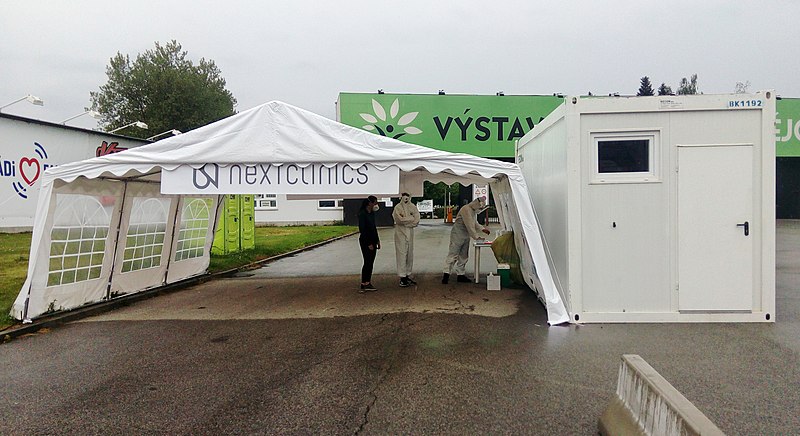Vaccine clinics provide a promising future for Guilford’s community
Tent operating as a drive through COVID testing center.
The state of COVID-19 on Guilford’s campus may be looking up, as community spread has dropped and vaccination opportunities have opened up for many members of the community. The most recent testing clinic reported optimistic results, with zero positive cases among 242 administered tests.
Within the past two weeks, Guilford has moved into a new method of conducting surveillance on the community for cases. Instead of randomized selection for testing, Guilford has implemented a cohort method. With this approach, three cohorts composed of Guilford students and staff are tested routinely to better track results and public safety information.
Although the week of March 9 yielded no positive tests for COVID-19, Guilford reported three positive cases in the previous week. This number indicates a decline in cases seen since weeks early in the spring semester, where the community saw surges in positive cases. This decreasing trend is a positive sign for Guilford and its efforts to limit community spread. Cohort testing will continue to track any emerging infection.
In addition to limited spread, this week marked another hopeful start for Guilford. Beginning March 11, UNC Greensboro held a vaccine clinic for university employees and opened it to faculty from colleges in the area. The clinic is open to college employees who are a part of Group 3. According to an update from UNC Greensboro, the clinic will be administering the Johnson & Johnson vaccine.
The Johnson & Johnson (J&J) vaccine is the first one-shot vaccine, and, although approved by the Food and Drug administration at the end of February, is the subject of questions concerning its effectiveness compared to the Pfizer and Moderna vaccines. Despite suspicions, the J&J vaccine’s efficacy has been approved, and it is now part of the vaccine allotments given in Guilford County.
In addition to the UNC Greensboro clinic, Guilford County has opened a large vaccination center in Four Seasons Mall, which is supported by federal funding from the Federal Emergency Management Agency (FEMA).
“The clinic can inoculate 3,000 or more people a day and is only one of 18 such sites across the country,” reported the Greensboro News & Record.
This growth in vaccine availability is promising for a hopeful return to normalcy and safety on campus, as Guilford students and staff are receiving immunity despite limited access for many students so far. One student was able to get vaccinated in her home state rather than locally.
“My doctor’s office, Texas Children’s Hospital, emailed me to notify me that I was eligible in Texas and that they had a dose for me,” said Guilford first-year Katy Farr. “I am currently in Texas, but I don’t make trips home at all frequently.”
“I was just able to fly back to get vaccinated, and it has felt way more taxing during COVID,” Farr continued. “Both this semester, and at the end of last semester when I went back home, flying was really tiring and stressful. I have to look into what airlines are still blocking middle seats, and even then sometimes I’ve gotten stuck next to someone. When I flew back home in February I ended up wearing three masks for about six hours.”
These troubles may soon be relieved since Farr has completed her vaccine regimen, and hopefully, other Guilford students may get the same opportunity.
Information from an update from Director of Public Safety Jermaine Thomas suggests that later in March, vaccines will be available to people living in group settings, as part of rollout to Group 4.
“This population includes students living in residence halls, campus apartments or other group living settings, who are not already vaccinated due to age, medical condition or job function,” the report stated.
As more of Guilford College develops immunity, guidelines and restrictions will likely change. On March 8, the Center for Disease Control and Prevention (CDC) published their first set of guidelines specific to those who have completed their vaccination processes, those who have had at least two weeks since they received their second dose, or a single dose J&J shot.
Among the changes is an update that it is safe for fully vaccinated people to gather indoors without masks or social distancing with other fully vaccinated individuals. Additionally, the CDC said that vaccinated people may be around unvaccinated members of one household indoors and without masks or social distancing, if that household is at low risk for severe COVID-19.
These developments will allow for students, faculty and families to interact with each other in new ways safely, hopefully returning to intimacy and connections that have been absent over the past year.






